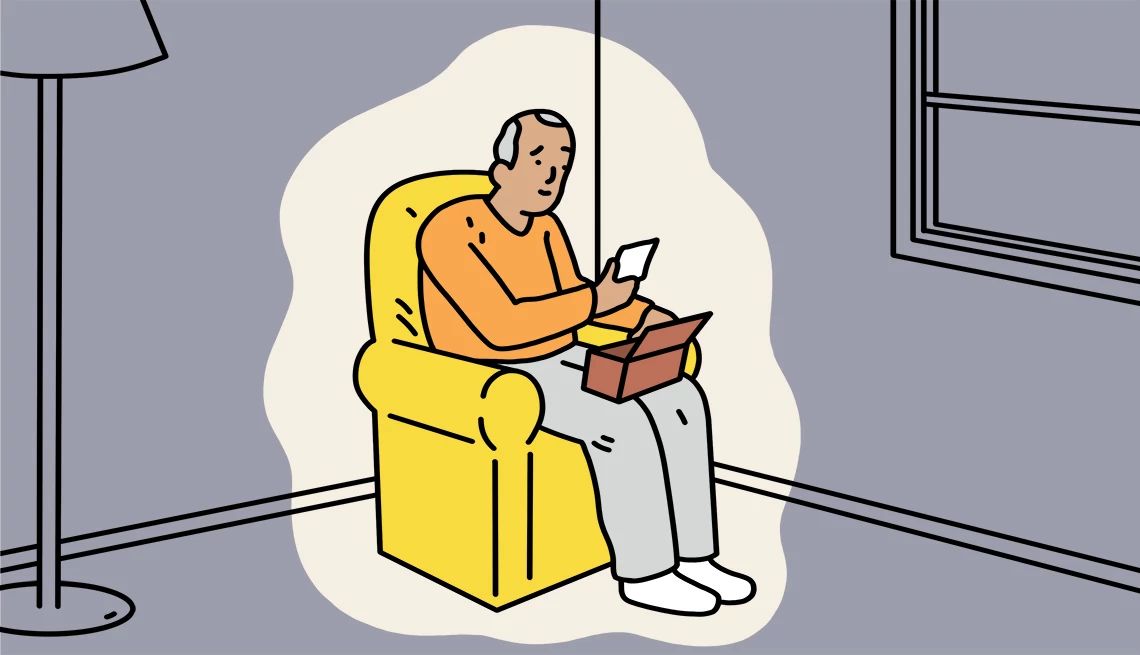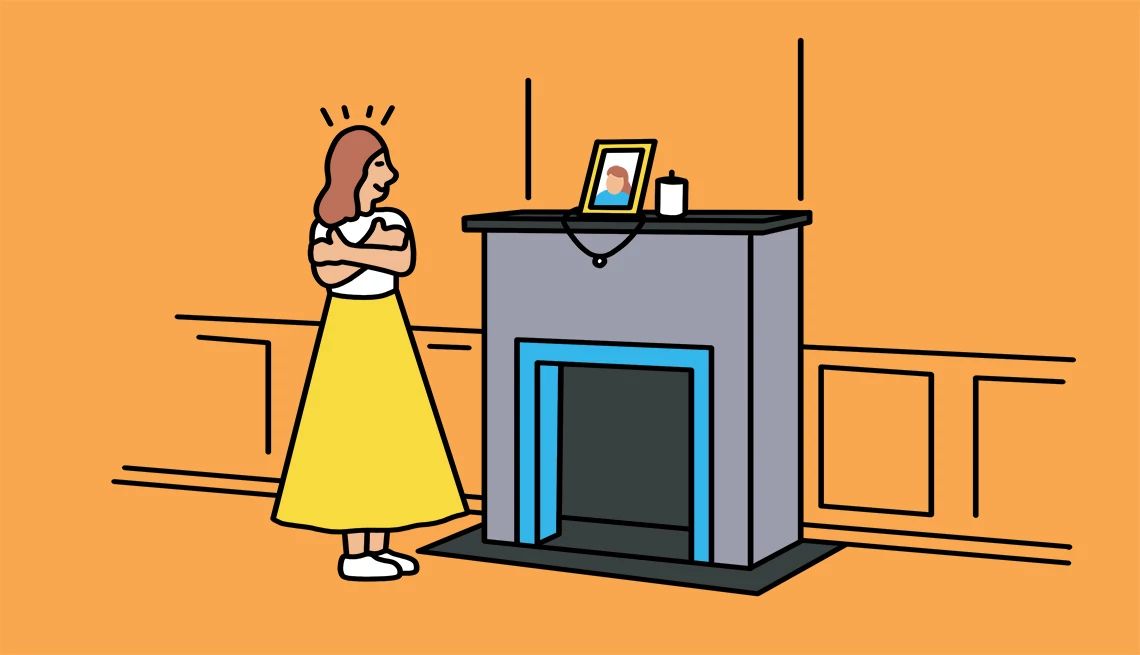AARP Hearing Center


The older you are, the more likely you are to go through grief and loss. Case in point: Of the 3.28 million deaths in the U.S. in 2022, 2.84 million (87 percent) were among people 55 and older, and 2.43 million (74 percent) were among people 65 and older, according to the Centers for Disease Control and Prevention. For many, the pain from a loss is so enduring and debilitating that they end up suffering from prolonged grief disorder, which the American Psychiatric Association describes as “intense and persistent grief that causes problems and interferes with daily life.” Whether your sorrow stems from death, divorce or illness, it can feel insurmountable. But it doesn’t have to. We’ve assembled 25 strategies to help you manage feelings of loss and, ultimately, survive them. Consider which ones might be useful for you, then share your own tips at the bottom of the page.
1. Name your grief
Hospice and palliative medicine physician BJ Miller likens grief to a disease: To treat it, you must first diagnose it. “I can’t tell you how often I talk to people who are feeling out of sorts, and I realize that they’re a few months out from a death in the family or a medical diagnosis or a divorce or some other huge event,” says Miller, coauthor of A Beginner’s Guide to the End: Practical Advice for Living Life and Facing Death. “To my eyes, it’s so clear that they’re in grief, but folks often don’t see that. So it starts with simply acknowledging grief.” Naming your grief helps you make sense of what you’re experiencing. “It’s almost like an anti-gaslighting phenomenon,” Miller says. “No, you’re not crazy. You have been feeling weird. And there’s a good reason for it.”
2. Share your grief
Although grief for many people is very personal and private, it’s important to share it with others, says David Kessler, founder of Grief.com and author of Finding Meaning: The Sixth Stage of Grief. “Grief and trauma aren’t healed in isolation … We need other people,” he says. “Grief needs to be witnessed. We need to tell our stories and be seen, heard and valued.” That advice is echoed by Alan Wolfelt, director of the Center for Loss & Life Transition and author of Understanding Your Grief: Ten Essential Touchstones for Finding Hope and Healing Your Heart. “By sharing your grief outside yourself, healing occurs,” Wolfelt writes in literature for grievers that his organization distributes to funeral homes and hospices across North America.
3. Diversify your support system
Grief researcher Lucy Hone echoes the importance of social support. “What we know about grief is that your social support system is the No. 1 predictive factor of healthy grieving,” says Hone, author of Resilient Grieving: How to Find Your Way Through Devastating Loss. “And it’s also the No. 1 modifiable factor.” However, when you’re building a support system, she says it’s important to diversify. Your network should include not only good listeners you can turn to when you need to talk, but also individuals who offer other kinds of support. For example, there’s practical support (people who can mow your lawn); informational support (people who can help you with the probate attorney); and memory support (people who can help keep the memory of your loved one alive).
4. Listen to your body
Grief isn’t just emotional. It’s also physical. Studies have found elevated levels of inflammation in bereaved spouses, which increases their risk for heart attack, stroke, cancer and even premature death. As recently as 2023, a study in the journal PLOS One found that widows and widowers were up to 70 percent more likely to die within a year of losing their spouse than similarly aged people who did not lose a spouse. So if you’re struggling with loss, it’s as important to mend your body as it is to mend your heart, Wolfelt writes. “Your feelings of loss and sadness will probably leave you fatigued,” he says. “Your ability to think clearly and make decisions may be impaired. And your low energy level may naturally slow you down. Respect what your body and mind are telling you. Caring for yourself doesn’t mean feeling sorry for yourself; it means you are using survival skills.”


5. Seek solace in support groups
It’s helpful to share your grief with the right people, so choose your audience wisely, Wolfelt suggests. “Find caring friends and relatives who will listen without judging,” he writes. “Avoid persons who are critical or who try to steal your grief from you. They may tell you, ‘keep your chin up’ or ‘carry on’ or ‘be happy.’ While these comments may be well-intended, you do not have to accept them.” That’s why the best listeners sometimes total strangers. “Friends and family want to fix our grief because they want us to feel better. But that can make us feel like we’re doing it wrong,” says Kessler, who suggests connecting with like-minded mourners via in-person or online support groups. Especially helpful are support groups that target a specific gender, age group or cause of death. “For example, someone who’s experienced the death of a spouse under 50 has different things to talk about than someone who’s experienced the death of a spouse over 70,” Kessler says.
6. Stay active
Although self-care often requires rest, exercise can be equally as important. “Grief is exhausting, so the temptation is to hunker down and lie on the couch,” Hone says. “Without physical activity … you are making it harder for your mind, body and soul to recover.” In fact, a 2023 study in the journal BMC Public Health found that physical activity can distract you from grief; clear your mind; provide an outlet for anger and frustration; create opportunities for pleasure, enjoyment and socialization; build self-confidence by helping you set and accomplish goals; help establish positive routines; ease the physical and emotional symptoms of grief; and enhance your mood.
7. Be authentic
Grief can be performative. Mourners often behave based on how they want to be perceived instead of how they actually feel. However, to process your grief, ditch the script and be your authentic self, suggests Steve Leder, senior rabbi at Wilshire Boulevard Temple in Los Angeles and author of The Beauty of What Remains: How Our Greatest Fear Becomes Our Greatest Gift. “If someone says to me, ‘Steve, I’ve never had a good relationship with my mother. She was always cold and withholding. But now that she’s gone, I’m going to have a whole different feeling about her,’ I’m going to say, ‘I doubt it. More than likely, you’re going to be relieved.’ And that’s OK,” Leder says. “We have to grant ourselves permission to be truthful about the dynamics of loss and what loss does and does not change about us.”
8. Follow your faith
If you’re religious or spiritual, give yourself permission to express your faith in ways that feel appropriate to you. “Allow yourself to be around people who understand and support your religious beliefs,” Wolfelt writes. “If you are angry with God because of the death of someone you loved, realize this feeling is a normal part of your grief work. Find someone to talk with who won’t be critical of whatever thoughts and feelings you need to explore.” But don’t assume that your faith protects you from grief. “You may hear someone say, ‘With faith, you don’t need to grieve.’ Don’t believe it,” Wolfelt writes. “Express your faith, but express your grief as well.”
9. Confront your grief
In his poem “A Servant to Servants,” the poet Robert Frost famously wrote, “The best way out is always through.” That’s certainly true of grief, according to Wolfelt, who recommends that you “move toward your grief.” “Denying your grief will only make it become more confusing and overwhelming. Embrace your grief and heal,” he writes. Leder agrees, likening grief to an ocean full of waves. If you try to stand up to a breaker, it will knock you down, toss you around and leave you gasping for air. “The best way … for most people to deal with an approaching wave is to lie down and let it wash over you,” Leder says. “Just float with it until you can stand up again.”































































You Might Also Like
Tips to Manage Your Stress
From scheduling stress and serenity to eating away the inflammation, here are ways to cope
A Caregiving Son’s Enduring Grief
Barry Jacobs shares how losing his father at a young age still impacts his life 50 years later
Ways to Find a Sense of Purpose
From committing random acts of kindness to telling your stories and solving a problem, read our tips
Recommended for You